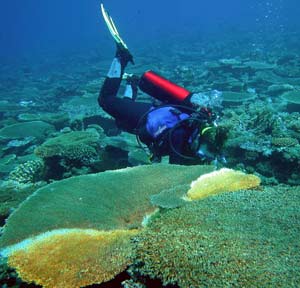Are corals more complex than humans?
A small coral can have the same number of genes and even more than humans. It is noteworthy that although the evolutionary difference is different, corals have many genes in the immune system like humans. And perhaps some of those genes also appear in corals before humans. Researching the genome of coral can bring great scientific value.
Professor David Miller of ARC Center for Coral Reef Research and the ARC Special Research Center for the Development of Molecular Genetics (Australia) said that corals are one of the animals The simplest thing in the world - but they have a large and complex genome equivalent to the human genome.

White disease spreads in Acropora coral
(Photo: cosmosmagazine)
'Four years ago, researchers in this field predicted that corals could have up to 10,000 genes - but now we have found these genes in corals and obviously this number is much more. half. Based on the evaluation of genetic discoveries, we estimate that corals have between 20,000 and 25,000 genes, compared with 20,000 to 23,000 for humans'.
Why a simple creature can have such a large number of genes is a mystery , but scientists are very interested in corals because it is close to the root of the genealogical tree of all living things. living. In addition, corals can give people new insights into the complex origins of the immune system and the nervous system in vertebrates.
About 10% to 12% of known coral genes are in a strange way similar to vertebrate animals - these genes have been lost in other animals. These are genes for the development of the nervous system, vision, DNA replication, stress responses and genes that are primarily in the immune system.
Professor Miller said: 'Indeed we have a lot in common with corals, although on the surface it doesn't seem like that. For example, we were surprised by the number of genes involved in human innate immunity in corals, as well as about their similarity. '
The meaning of this is that scientists now suspect that corals are facing some diseases such as 'black border', 'white disease', 'white smallpox', 'white syndrome'. ' and' white border '.
The coral's immune system is still a mystery . How corals can cope with outbreaks of disease worldwide, and the extent to which they are affected by other problems caused by human behavior . are important questions. The similarity between the innate immune system of corals and humans suggests that these two immune systems can work the same, and hopefully we can apply what we know about human health to understand more about coral diseases.
'It is also possible that we will gain direct benefits, by learning about the ancestor's immune gene pool and their function in a simple organism, we will have new insights, help we are in the fight against human diseases', Professor Miller added.
The abundance of coral genes - unexpectedly large, and a large number of genes thought by researchers to appear and develop long after the coral's existence - will certainly bring new knowledge about evolution.
It seems that all animals lose their genes during evolution. Animals with short lifespans - like fruit flies - lose their genes faster. Coral until age 5 has physiological ability (compared to laboratory fruit flies that live only three to four weeks), and long-lived and crowded corals can become a ' living museum '. 'about the aquatic animal gene.
Coral is a simple animal, so although there are many genes, they only combine 12-14 types of body cells, while humans have hundreds and thousands of different cell types.
It is still unclear which species has the best genetic formula for long-term survival. The first corals appeared 240 million years ago, while humans appeared only 2% of the time that corals existed.
As an Australian scientist, Professor Miller is calling for a project to study the coral genome in Australia: '(Australia) No project about understanding the genome of corals, wear although such a project can have great medical benefits as well as other branches of science '.
- Coral is the longest living animal on Earth
- What will happen if the entire coral reef on this Earth disappears?
- New hope for corals to die from global warming
- Vietnamese marine corals are severely destroyed
- Discovering corals in depths 'never thought of'
- The strange coral lives in the cave
- Artificial corals can clean seawater in China
- Is coral a plant or animal?
- Vietnamese corals are comparable to world corals
- Scientists discovered 'self-healing' super corals in Hawaii
- Discover the magic beauty of sea corals
- Corals reject shrimp eggs, choose to eat micro-plastic seeds
 Surprised: Fish that live in the dark ocean still see colors
Surprised: Fish that live in the dark ocean still see colors Japan suddenly caught the creature that caused the earthquake in the legend
Japan suddenly caught the creature that caused the earthquake in the legend A series of gray whale carcasses washed ashore on California's coast
A series of gray whale carcasses washed ashore on California's coast Compare the size of shark species in the world
Compare the size of shark species in the world